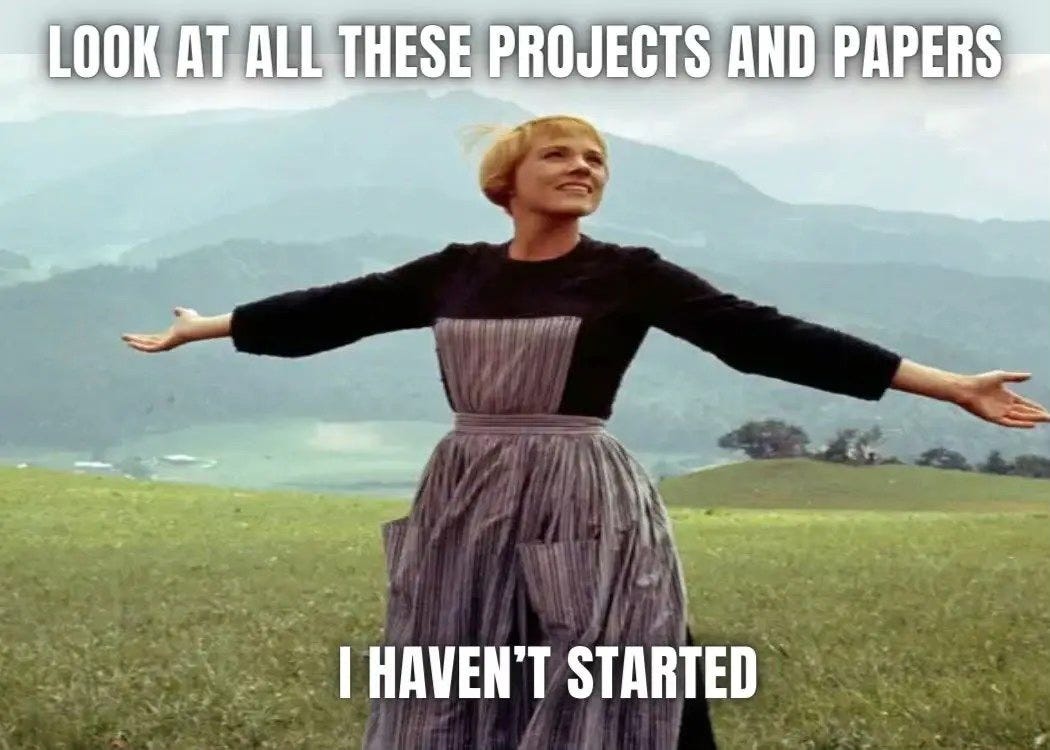“If I let go of perfectionism I won’t be as good as I am now.” (Part 1 of 2)
Perfectionism demands we perform as superbly as possible to be merely sufficient as a person.
A reader named Angie asked an excellent question that drilled straight down to the bedrock. Here it is in her words:
I've been reading your posts on perfectionism and I can relate to a lot of things, and I understand the tips you give us to filter out the lies that perfectionism tells us. But I still struggle with the fear that if I let go of perfectionism I will fail at everything I do, or I won't be as good as I am now. Do you have any advice for that?
Yes! I love this question so much that the answer will take two newsletters. Today is Part 1—we’ll define perfectionism and describe its cycle. In Part 2 we’ll cover how to start letting go.
I totally hear Angie. The high standards and strong work ethic of perfectionism have bought me a lot, too. It’s hard to let go. But I promise we’re not going to do a 180 and end up wearing boxers and a bathrobe while eating Fluff straight from the jar. It’s just not in our DNA.
As I say in How to Be Enough, we don’t need to let it go. This ain’t Frozen. Instead, this is The Beatles: Let It Be. Perfectionism will still be there, calling to us, but we don’t have to respond as intensely.
But I’m getting ahead of myself.
Let’s start with a definition of perfectionism so we’re all on the same page:
Perfectionism is a mindset that demands we perform as superbly as possible to be sufficient as a person. We conflate our goodness as a person with our performance in areas we care about—academics, our job, our social behavior, fitness, appearance, parenting, home organization, the list goes on.
According to Drs. Roz Shafran, Zafra Cooper, and Christopher Fairburn when they were colleagues at Oxford University, perfectionism is a cycle. Here’s what happens:
First, we set personally demanding standards for ourselves. Examples include expecting ourselves to have the body we had at 20 at 40, expecting ourselves to write our whole term paper in one sitting, expecting not to have awkward moments as we’re getting to know someone new, expecting ourselves to focus like a laser during the workday and never get distracted by, oh, say, Substack.
Because our standards are personally demanding, that means we set the bar really high. But because they’re so high—unrealistic, even—one of three things happens.
One: we don’t reach the standard. We couldn’t clean the whole house in one go, after all. We spoke up in the meeting but felt anxious, not cool and confident like we had hoped.
Two: because the standard was so demanding, we avoided it. We felt overwhelmed. We procrastinated. We checked our email again instead of working on the big project. We looked at our impossibly long to-do list, felt like we couldn’t breathe, and ended up scrolling Instagram.
And then? After we 1) failed or 2) avoided, we criticize ourselves. This could be anything from overt name calling like “I’m such an idiot,” to rhetorical questions like “What is wrong with me?” to a general creeping sense of disappointment and dissatisfaction with ourselves.
Or, the third option: we pull out all the stops and meet our standard! But then we decide the standard was insufficiently demanding in the first place: “The exam must have been easy.” “I was just lucky.” “Well, now I have to run my next marathon even faster.”
And then? We re-set our standards even higher. The cycle starts again, and round and round we go.
Repeat this day after day, maybe for years. This cycle ensures we rack up a string of (perceived) failures. And that, over time, makes us feel like failures (or at least chronically dissatisfied, regretful, or discouraged about ourselves and our lives.)
The culprit driving this whole cycle is overevaluation, the conflation of our performance and our character. Our evaluation of our performance goes overboard—it determines not only whether what we did is good, but whether we ourselves are good.
Overevaluation is personal: if we can do demanding things correctly, we reason, then we, too, are correct.
But it’s also interpersonal: a deeply buried part of our brain tells us that the way to earn acceptance and belonging is to perform well and be good at things. But do you choose your friends because of their skills and accomplishments? No, you likely choose them because of how you feel when you’re together: happy, supported, genuine—like you can be yourself.
Wow, I just laid a lot on you. Let’s digest that for a moment.
Next week we’ll dive into mindset shifts to let perfectionism be. I cover a lot of these in How to Be Enough, but frankly, I don’t want to wait until January to share them, plus, if your memory is anything like mine (read: a sieve), we’ll talk about this all again anyway.
If this Substack (or heck, any of my work) has been helpful to you and you’d like to read more, please consider a preorder. Preorders really work! They send a message to publishers and booksellers, drive shelf space and print runs, and make my work possible. Thanks for considering!
Be kind to others and yourself!











Hi Ellen! Thank you so much for the reply!!! I feel so special that you replied to me in a newsletter, but 2 PARTS?? that's so cool ahahah. I can relate so so much to options 1 and 3 and I love the letting be instead of letting go hahaha
I'm 100% gonna have to read How to be Enough in January!
All 3 !